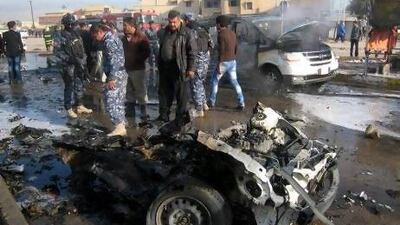BAGHDAD // A series of attacks in various parts of Iraq killed at least 50 people and injured more than 200.
The interior ministry blamed Al Qaeda militants for the apparently coordinated bombings and shootings that took place in Baghdad and 11 other cities. The attackers hit government offices, restaurants and one explosion in the town of Musayyib came close to a primary school.
Nationwide security forces appeared to be targeted in at least 14 attacks, including a drive-by shooting in Baghdad that killed six policemen at a checkpoint before dawn. Police patrols in the capital and beyond also were hit by roadside bombs and, in once case, a suicide bomber who blew up his car outside a police station in the city of Baqouba, 60 kilometres north-east of Baghdad.
"The terrorist Al Qaeda organisation is trying to send messages to its supporters that it is still operating on Iraqi soil, and that it has the capability to strike in the capital and the cities and both big and small regions," said a statement on the interior ministry's website.
The casualties were tallied by local security and hospital officials in the cities where the attacks occurred. Nearly all spoke on condition of anonymity because they were not authorised to release the information.
Hassan Jihad, a member of the security and defence commission in parliament, said the attacks show that the Iraqi armed forces and the country's security apparatus were not where they need to be.
"Terrorist groups are still moving in several Iraqi cities and can penetrate the Iraqi forces significantly," he said.
The single deadliest strike, a car bomb in Baghdad's downtown shopping district of Karradah, killed nine people and wounded 26. The blast could be felt blocks away, shaking buildings and windows.
"What is happening today are not simple security violations. It is a huge security failure and disaster," said Ahmed Al Tamimi, who was working at an education ministry office a block away from a restaurant that was bombed in the Shiite neighbourhood of Kazimiyah in Baghdad. "We want to know: What were the thousands of policemen and soldiers in Baghdad doing today while the terrorists were roaming the city and spreading violence?"
Ahmed Alkhafaji, an independent political analyst, echoed those thoughts, saying the attacks prove that the Iraqi security forces were "incapable of implementing their duty and security for the citizens".
He said the attacks would fuel the sectarian battle in the country between Sunnis and Shiites and the internal ones within the groups themselves. He also said the attack was meant to derail an Arab League summit set for Baghdad at the end of March.
Yesterday was the deadliest day in Iraq since January 14, when 53 people were killed in a suicide bombing just outside Basra.
Parliament speaker Osama Al Nujaifi said in a statement that the attacks "aim to stoke the fires of strife among the sons of the Iraqi people, and to make the holding of the Arab summit and the national meeting fail, and give a clear sign of the involvement of foreign parties trying to export their internal problems to Iraq."
The Iraq prime minister, Nouri Al Maliki, said that "some countries have started to export a wave of ignorant ... fatwas on Iraq, to kill a citizen, whether Sunni or Shiite," noting that "these countries do not want stability in Iraq".
There have been a series of large-scale attacks by insurgents since the last US troops left Iraq in mid-December. Shortly after the withdrawal, a major political crisis with sectarian undertones erupted as well when Shiite-dominated authorities sought to arrest the Sunni vice president, Tariq Al Hashemi, on allegations he directed death squads targeting security forces and government officials.
Late Wednesday, Iraq's interior ministry announced the capture of Waleed Khalid Ali, accused as a top leader of the Ansar Al Sunna insurgent group linked to Al Qaeda. The government said Mr Ali was caught trying to enter Iraq from Syria, where Al Qaeda groups are helping opposition forces who are trying to overthrow President Bashar Al Assad.
But the coordinated nature of yesterday's attacks show they likely were planned long before the arrest.
Widespread violence has decreased in recent years, but bombings and deadly shootings still happen almost daily.
nlatif@thenational.ae
* With additional reporting by the Associated Press, Reuters and Agence France-Presse

